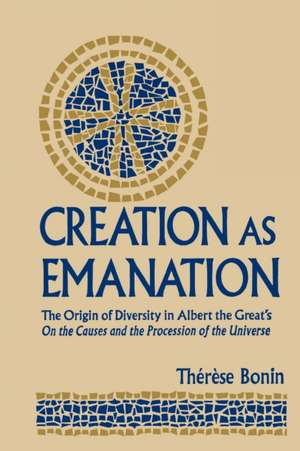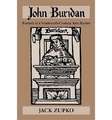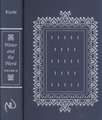Creation as Emanation – The Origin of Diversity in Albert the Great`s On the Causes and the Procession of the Universe: Publications in Medieval Studies
Autor Therese Boninen Limba Engleză Paperback – 30 iul 2017
The Liber de causis (De causis et processu universitatis a prima causa), a monotheistic reworking of Proclus’ Elements of Theology, was translated from Arabic into Latin in the twelfth century, with an attribution to Aristotle. Considering this Neoplatonic text a product of Aristotle's school and even the completion of Aristotle’s Metaphysics, Albert the Great concluded his series of Aristotelian paraphrases by commenting on it.
To do so was to invite controversy, since accidents of translation had made many readers think that the Liber de causis taught that God made only the first creature, which in turn created the diverse multitude of lesser things. Thus, Albert’s contemporaries in the Christian West took the text to uphold the supposedly Aristotelian doctrine that from the One only one thing can emanate—a doctrine they rejected, believing as they did that God freely determined the number and kinds of creatures. Albert, however, defended the philosophers against the theologians of his day, denying that the thesis "from the One only one proceeds" removed God’s causality from the diversity and multiplicity of our world. This Albert did by appealing to a greater theologian, Pseudo-Dionysius the Areopagite, and equating the being that is the subject of metaphysics with the procession of Being from God's intellect, a procession Dionysius described in On the Divine Names.
Creation as Emanation examines Albert's reading of the Liber de causis with an eye toward two questions: First, how does Albert view the relation between faith and reason, so that he can identify creation from nothing with emanation from God? And second, how does he understand Platonism and Aristotelianism, so that he can avoid the misreadings of his fellow theologians by finding in a late-fifth-century Neoplatonist the key to Aristotle’s meaning?
To do so was to invite controversy, since accidents of translation had made many readers think that the Liber de causis taught that God made only the first creature, which in turn created the diverse multitude of lesser things. Thus, Albert’s contemporaries in the Christian West took the text to uphold the supposedly Aristotelian doctrine that from the One only one thing can emanate—a doctrine they rejected, believing as they did that God freely determined the number and kinds of creatures. Albert, however, defended the philosophers against the theologians of his day, denying that the thesis "from the One only one proceeds" removed God’s causality from the diversity and multiplicity of our world. This Albert did by appealing to a greater theologian, Pseudo-Dionysius the Areopagite, and equating the being that is the subject of metaphysics with the procession of Being from God's intellect, a procession Dionysius described in On the Divine Names.
Creation as Emanation examines Albert's reading of the Liber de causis with an eye toward two questions: First, how does Albert view the relation between faith and reason, so that he can identify creation from nothing with emanation from God? And second, how does he understand Platonism and Aristotelianism, so that he can avoid the misreadings of his fellow theologians by finding in a late-fifth-century Neoplatonist the key to Aristotle’s meaning?
| Toate formatele și edițiile | Preț | Express |
|---|---|---|
| Paperback (1) | 312.32 lei 6-8 săpt. | |
| MR – University of Notre Dame Press – 30 iul 2017 | 312.32 lei 6-8 săpt. | |
| Hardback (1) | 586.13 lei 6-8 săpt. | |
| MR – University of Notre Dame Press – 24 apr 2001 | 586.13 lei 6-8 săpt. |
Preț: 312.32 lei
Nou
Puncte Express: 468
Preț estimativ în valută:
59.76€ • 63.91$ • 49.83£
59.76€ • 63.91$ • 49.83£
Carte tipărită la comandă
Livrare economică 18 aprilie-02 mai
Preluare comenzi: 021 569.72.76
Specificații
ISBN-13: 9780268159108
ISBN-10: 0268159106
Pagini: 188
Dimensiuni: 187 x 229 x 12 mm
Greutate: 0.28 kg
Ediția:1
Editura: MR – University of Notre Dame Press
Seria Publications in Medieval Studies
ISBN-10: 0268159106
Pagini: 188
Dimensiuni: 187 x 229 x 12 mm
Greutate: 0.28 kg
Ediția:1
Editura: MR – University of Notre Dame Press
Seria Publications in Medieval Studies
Recenzii
“This relatively short, but amply footnoted, work is written in the light of an exhaustive bibliography and with a meticulous care in establishing the best provisional text of Albert’s commentary on the Liber de causis.” —Journal of Ecclesiastical History
Notă biografică
Thérèse Bonin is associate professor of philosophy at Duquesne University where she directs the pre-theology program.






















